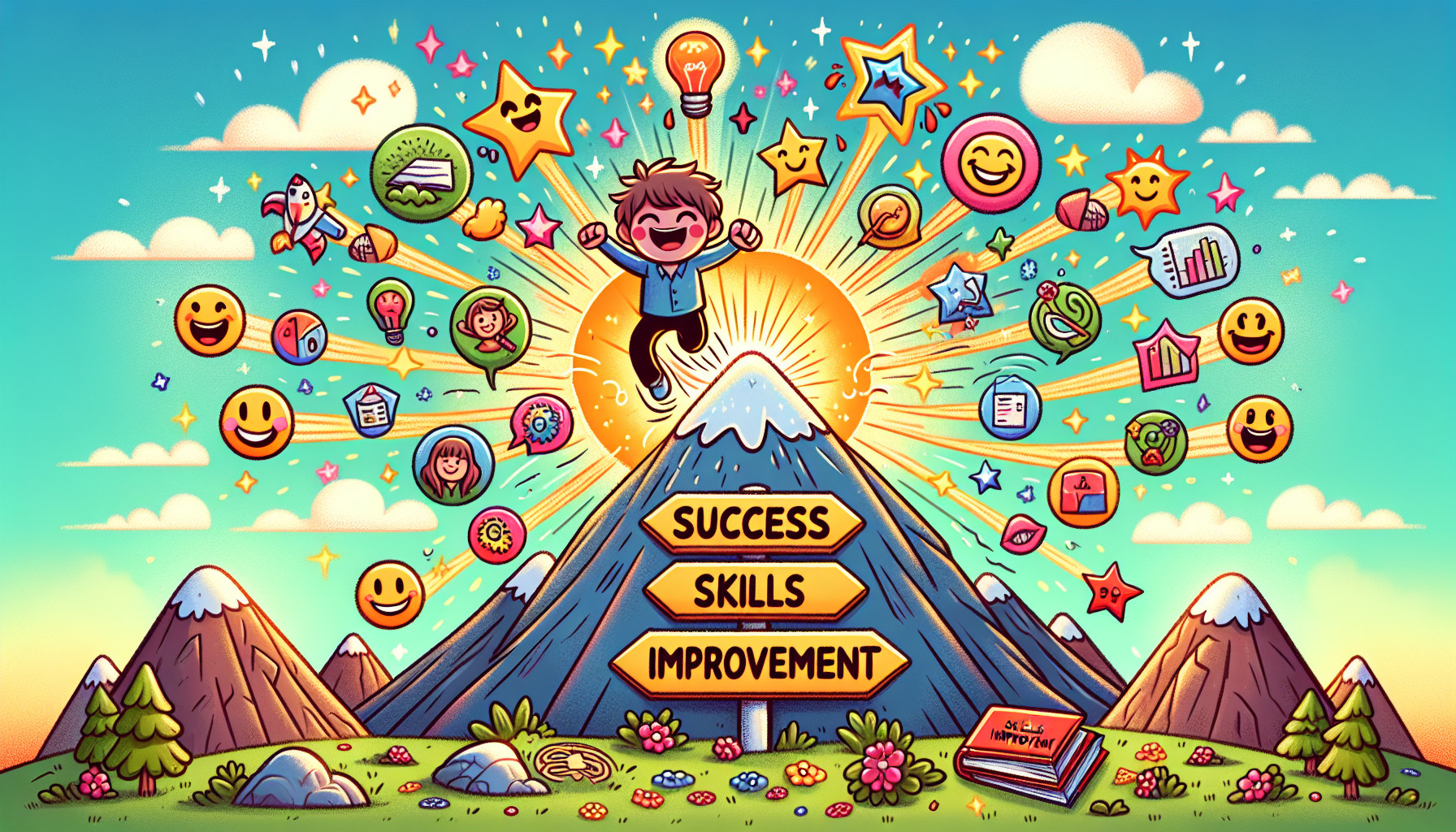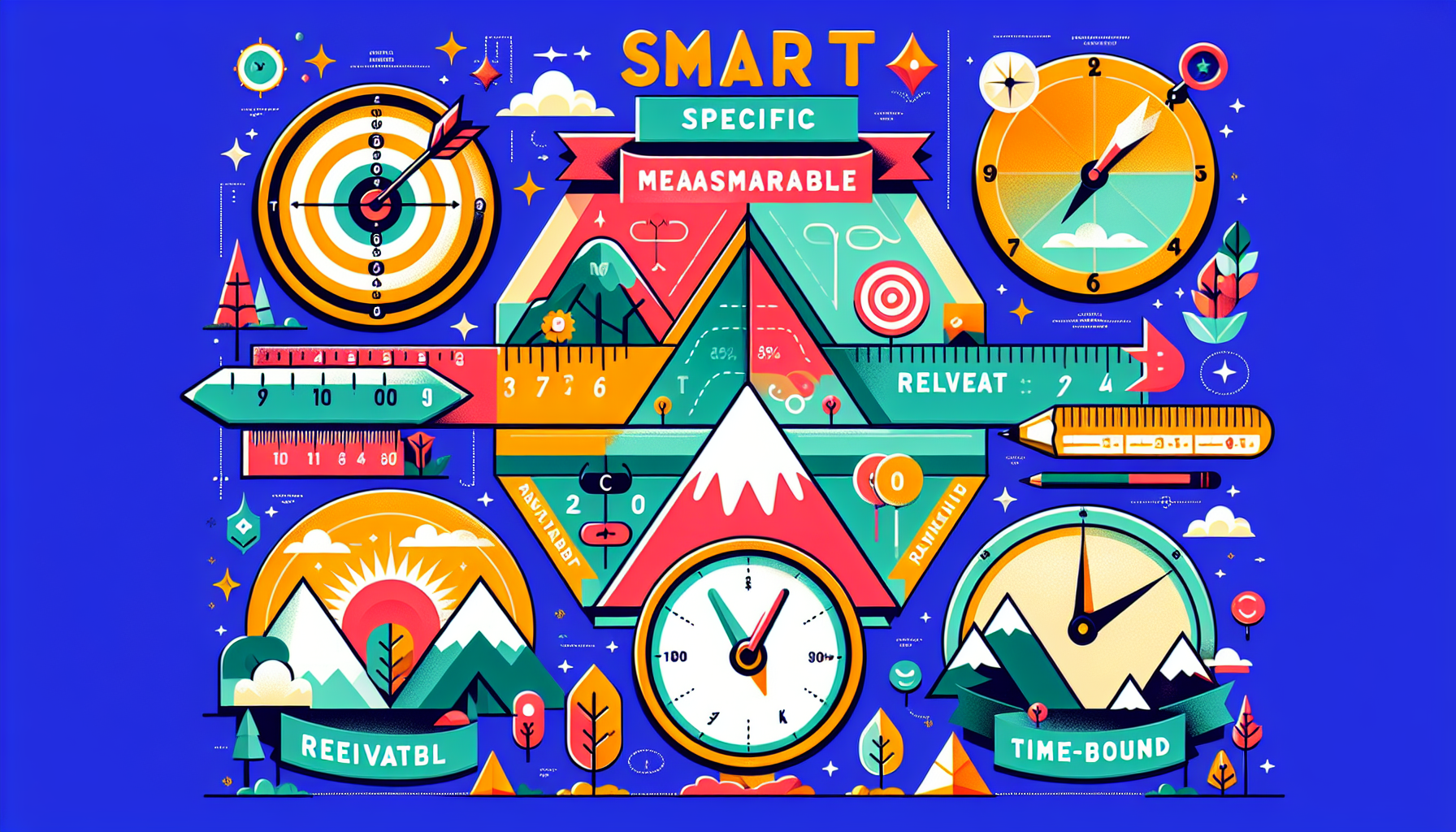Looking to boost your career and life? Personal development goals can help you achieve this. In this article, we’ll cover the top 10 goals that can enhance your abilities and improve your quality of life. Learn why personal development goals matter and how to set them effectively.
Key Takeaways
- Setting personal development goals fosters self-improvement, adaptability, and resilience, crucial for both personal and career growth.
- Utilizing the SMART criteria for goal setting ensures clarity, motivation, and a structured pathway to achieving your objectives.
- Investing in skills development, emotional intelligence, and work-life balance creates a fulfilling and productive professional life.
Understanding Personal Development Goals

Personal development goals help you realize your full potential and achieve success in various aspects of life. They serve as benchmarks, guiding you to enhance your abilities and improve your overall quality of life. To set personal development goals and strive toward these objectives fosters creativity and innovative thinking, allowing you to perform at your best.
The beauty of personal development goals lies in their flexibility. As you grow and evolve, so can your goals. This adaptability ensures a lifelong commitment to self-improvement, allowing you to handle life’s changes with resilience and confidence. Maintaining motivation in both personal and professional spheres contributes to a healthier work culture and increased job satisfaction.
Benefits of Setting Personal Development Goals

Personal development goals provide clear direction in life, aiding in the achievement of aspirations. These goals assist in making informed decisions and prioritizing tasks effectively. Focusing your energy on what truly matters enhances motivation and drive toward your objectives.
Pursuing personal development goals cultivates self-discipline, resilience, and the ability to overcome challenges. Achieving these goals boosts self-confidence and fosters a growth mindset, encouraging further goal-setting and continuous improvement.
Defining career objectives facilitates professional growth and skill development, making your career goals more attainable.
Examples of Personal Development Goals for Professional Growth
Personal development goal are crucial for professional growth, leading to improved job performance and career development. Clear goals help deepen your knowledge through workshops and specialized training programs. For example, committing to continuous learning by completing ten new books related to your profession by the end of the year can be a powerful goal.
Another example is improving decision-making skills by aiming to make more logical decisions rather than emotional ones by the end of each quarter. Overall professional development can target specific skills like enhancing technical proficiency or communication skills.
Setting revenue generation targets can also help enhance your business acumen and drive performance.
Improve Time Management Skills
Effective time management skills enhance productivity and reduce stress. Setting priorities, using time management tools, and minimizing distractions help you make the most of your time and achieve a better work-life balance. Tools like calendars, to-do lists, and time-tracking apps can be invaluable in staying organized and focused.
Strategies such as delegating tasks and creating more personal time also contribute to a balanced life. Mastering time management boosts professional efficiency while ensuring ample time for personal growth and relaxation.
Enhance Communication Skills
Effective communication skills are crucial for success in both professional and personal settings. Key components include active listening, clear writing, and confident public speaking. Techniques like active listening and offering clear explanations can enhance your communication effectiveness.
Organizations can support skill development by offering courses and providing opportunities for practice, such as presentation workshops and coaching. Networking also plays a significant role in enhancing public speaking and active listening abilities.
Mastering these skills helps build credibility, influence others, and achieve career goals.
Develop Leadership Skills
Leadership skills are vital for career growth and professional success. Effective leadership involves taking on roles, communicating effectively, and building a clear vision. Promoting continuous learning and strategic thinking expands leadership capabilities and helps guide teams effectively.
Mentoring others enhances leadership development and communication skills while contributing to their growth. Improving decision-making skills by adopting a logic-based process and evaluating outcomes is crucial for effective leadership.
Focusing on inspiring and motivating team members helps build high-performing teams and achieve career aspirations.
Personal Development Goals for Emotional Intelligence

Emotional intelligence is key to personal and professional success. It involves understanding and managing your own emotions and recognizing and responding appropriately to others’ emotions. Developing emotional intelligence can improve teamwork, leadership, and client relations.
Key areas of emotional intelligence include self-awareness, empathy, and effective emotion management. Enhancing these skills fosters better interpersonal relationships, improves stress management, and creates a positive and collaborative work environment.
Increase Self-Awareness
Self-awareness is crucial for understanding your emotions and behaviors, forming the foundation for personal growth. Improving feedback skills can help you understand how others perceive you, enhancing self-awareness. Using less negative language when giving feedback fosters a positive environment for sharing and receiving constructive criticism.
Developing cognitive flexibility through self-awareness and routine changes enhances your ability to adapt and understand your reactions to various situations. These techniques improve self-awareness and contribute to overall personal and professional growth.
Build Empathy
Empathy, the ability to understand and share others’ feelings, is crucial for building strong interpersonal relationships. Techniques like active listening, open communication, and expressing genuine interest in others help build empathy.
Applying empathy techniques leads to better collaboration, improved trust, and stronger teamwork dynamics. Fostering empathy is essential for personal relationships and creating a positive, collaborative work environment.
Manage Stress Effectively
Effective stress management is crucial for maintaining job satisfaction and a healthy work-life balance. Strategies like mindfulness practices, time management, and hobbies can improve mental and physical health.
Aim for seven hours of sleep daily and take one mental health day each month to recharge and maintain productivity. Regulated breaks and stress management techniques increase resilience and flexibility in handling life’s challenges.
Setting SMART Personal Development Goals

Setting SMART personal development goals clarifies your ideas and focuses your efforts effectively. SMART stands for Specific, Measurable, Achievable, Relevant, and Time-bound, criteria originating from Peter Drucker’s Management by Objectives concept.
Specific and measurable goals help track progress and maintain motivation. Achievable and relevant goals stretch your abilities while aligning with broader objectives. Setting a timeline prioritizes them over daily tasks.
SMART goals enhance the likelihood of achieving your objectives by providing defined criteria and direction.
Creating a Personal Development Plan
A personal development plan serves as a focused guide for individual growth and success. Clear development goals provide a roadmap, helping you track progress and make professional goals more attainable.
Effective goals should have measurable criteria and a deadline to encourage accountability and break them into manageable parts. Aligning actions with aspirations ensures effective personal development. Asking focused questions helps understand the necessary actions to achieve your goals.
Identify Key Areas for Improvement
Self-assessment is the first step in identifying areas for improvement. Reflect on your existing skills, responsibilities, and feedback from evaluations. Consider where improvements are desired and what new skills could advance your career.
Breaking goals into smaller, actionable steps is an effective strategy for managing personal development goals.
Set Clear Objectives
Clear and measurable goals ensure clarity and focus in a personal development plan. Objectives should be specific enough to eliminate ambiguity and include actionable steps to meet the defined goals.
Setting a timeline for each goal avoids procrastination and maintains accountability. Visualization serves as a strong motivator, increasing the likelihood of success. Using positive language like ‘I will’ instead of ‘I might’ fosters a more affirmative approach to goal setting.
Monitor and Adjust Goals
Monitoring progress toward personal development goals ensures efforts align with desired outcomes and allows for necessary adjustments. Regular check-ins help assess progress and make timely adjustments based on feedback and obstacles.
A support system, including mentors and peers, provides valuable perspectives and helps identify overlooked areas affecting progress. Celebrating successes, no matter how small, maintains enthusiasm and motivation throughout the personal development journey.
Personal Development Goals for Work-Life Balance

Achieving a good work-life balance enhances overall productivity as content individuals tend to focus better at work. Effective work-life balance maintains mental well-being by allocating time for personal recharging.
Investing in work-life balance strengthens personal relationships by allowing time for family and friends. Strategies like flexible scheduling, remote work options, and setting boundaries between work and home support individual work-life balance.
Practicing mindfulness and taking breaks helps manage stress effectively and sustain work-life harmony.
Enhancing Professional Relationships
Enhancing professional relationships is crucial for career growth and job satisfaction. Networking should be approached as forming genuine connections rather than transactional activities. Joining professional groups and attending networking events can facilitate new social connections and expand your network effectively.
Organizations can support networking skills by offering opportunities, mentoring programs, and networking tools. Celebrating achievements fosters a supportive and collaborative work environment. Regular feedback from peers and practices like empathy, clear communication, and collaborative problem-solving significantly enhance workplace relationships.
Leveraging Online Courses for Skill Development
Online courses play a significant role in acquiring new skills and adapting to evolving industry standards. Lifelong learning involves acquiring new knowledge daily in your field. Self-paced online courses enhance your skills without disrupting your work schedule, making it easier to balance learning with professional life.
Online courses help professionals stay updated with the latest trends and technologies in their industry. Leveraging online courses continuously develops your technical skills, improving overall professional capabilities and career advancement prospects.
Practicing Mindfulness and Gratitude
Practicing mindfulness enhances energy levels, making daily tasks feel less overwhelming. Mindfulness practices lower blood pressure by fostering moments of appreciation and connection. Focusing on positive aspects of life through gratitude enhances overall feelings of joy and satisfaction.
Regularly noting things to be grateful for improves sleep quality and duration. Individuals who practice gratitude often take better care of their health, demonstrating improved self-control.
Practicing mindfulness and gratitude significantly improves mental and physical health, leading to a more balanced and fulfilling life.
Summary
In summary, setting personal development goals is a powerful way to achieve personal and professional success. These goals provide a clear direction, enhance motivation, and foster self-discipline. By focusing on areas such as time management, communication, leadership, and emotional intelligence, you can significantly improve your quality of life and career prospects.
Remember, personal development is a lifelong journey. Continuously monitor and adjust your goals, leverage online courses for skill development, and practice mindfulness and gratitude. By doing so, you can create a fulfilling and balanced life, achieving your career aspirations and personal growth.



